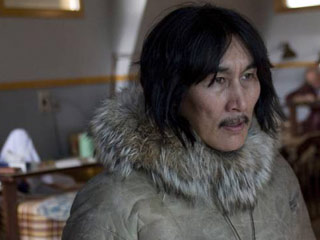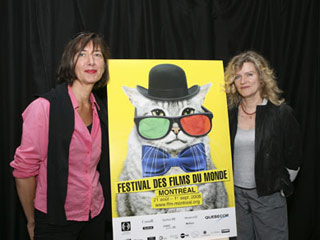Next story: Food For Thought: Really Slow Cooking
What The World Is Watching: The Montreal Film Festival
by M. Faust
The Montreal World Film Festival showcases the films other countries make for themselves
Short of spending years traveling around the world and living in different places, something few of us have either the time or money to do, the best way of learning about the lives of people in other countries is to watch movies made in those countries. For 15 years I’ve spent the end of August doing just that at the Montreal World Film Festival (WFF, or FFM to the cities’ majority Francophones).

I’ve always found the WFF particularly enlightening because it concentrates less on movies made for international distribution than on the ones made for viewers in their home countries. It seems to me that these provide a much better reflection of different cultures as they see themselves.
This was especially true in the case of Baby Doll Night, from Egypt. Egypt has the Middle East’s largest film industry, Like Bollywood films without the music, the popular Egyptian films I have seen tend to be very broad, presenting their subjects with comedy and melodrama that can uncomfortably overlap to viewers not used to this style. That’s often true even of Egypt’s most internationally renowned filmmaker, the late Yussef Chahaine, to whom this year’s WFF was dedicated.
Having premiered at the Cannes film festival a few months ago, Baby Doll Night was clearly a prestige production, with a budget three times that of the average Egyptian feature and an all-star cast. Egyptian dignitaries were even present at the Montreal screening. All of which made the quality of the film itself all the more baffling. It is the story of a Egyptian national working as a travel agent in the US. On New Year’s Eve he gets the chance for an overnight trip back home, when he hopes to visit the wife he hasn’t seen for a year and, um, start a family. (The title refers to the article of lingerie he brings with him as a gift.) When he arrives, however, his story becomes intermixed with that of a terrorist bombing being planned by a former Egyptian military hero. And while the film opens with an explicit statement that justifying terrorism is “the worst crime [that can be] committed against humanity,” it goes on to do very nearly that. In Baby Doll Night’s most jaw-dropping sequence, a flashback shows us the terrorist’s imprisonment in Abu Ghraib, where he is not only the masked figure in all of the horrifying photographs we’ve seen, but the subject of a sadistic castration. Just as I was reeling from that, we go to the story of the grandparents of another character, Jews who were exterminated in a Nazi death camp. All of this is in a film with a chubby middle-aged swain battling all kinds of comic barriers to finding a room where he can be alone with his wife.
Fortunately, other films I saw in Montreal presented more balanced views of the lives of their characters. One of my favorites was Okuribito (Departures), from Japan, about Daigo, a young man who, unable to make a living as a symphony musician, returns with his wife to the small town of his birth, and takes the only decently paying job he can find, preparing the bodies of the deceased for cremation. This is a ritualized procedure that is not similar to what undertakers do in our society: The body, chastely wrapped, is washed, given appropriate cosmetics, and presented, all within view of the family. In the past this ritual was performed by the deceased’s family members, and Daigo finds that old friends and even his wife consider it a shameful occupation. In this respect, Okuribito may be as much of a revelation to Japanese audiences as it was to me. Directed with calm precision by Yojiro Takita, the film may strike some viewers as sentimental—but then, so does Cinema Paradiso.
That history is written by the victors was sadly demonstrated in Katyn, the newest film from Andrzej Wajda, Poland’s cinematic historian. It was nominated for Best Foreign Language Film at this spring’s Academy Awards, but has yet to find an American distributor. (There was a time when any film from such an eminent world filmmaker or one so recognized by the Oscars was a shoo-in for American release. Sadly, that is no longer the case.) Katyn is a forest near the Polish-Russian border where, on March 5, 1940, thousands of Polish prisoners were slaughtered by the Soviets. (Along with several simultaneous incidents in other locations, the total number of victims is estimated at nearly 22,000.) When the mass graves were discovered in 1943 it was immediately recognized as Stalin’s work. Yet when the USSR occupied Poland in the post-war era, they shifted blame to the Nazis, and the international community was loathe to argue with them. Wajda uses this story and its coverup as a damning demonstration that wars seldom end with the signing of treaties: The true story of Katyn was repressed until after the collapse of the Soviet Union, and efforts at even symbolic reparations are still being stonewalled.

On to happier fare. The Belgian-French coproduction Rumba is the first feature film by Dominique Abel and Fiona Gordon, dancers who perform in the French version of burlesque. They play a pair of small-town schoolteachers who live to dance, and watching them throw themselves uninhibitedly into eccentric Latin-styled dances is more than enough reason to see the film. But when life starts to throw them some curves, they adapt in a deadpan style befitting the great silent comics like Buster Keaton (the film contains almost no dialogue). With a distinctive visual style that combines Pee-wee’s Playhouse with Jim Jarmusch minimalism, Rumba is a treat that would surely appeal to audiences who enjoyed Delicatessen or Les Triplettes de Belleville.
Another French comedy, Passe Passe (Off and Running), was more conventional, though enjoyable nonetheless for a vivacious performance by Nathalie Baye as the mistress of a government minister trying to provide for her future by blackmailing him about an illegal arms deal in which he made her the go-between. Édouard Baer is equally appealing as the loser she enlists to drive her out of town. Star quality doesn’t keep this from stalling in the third act, making this an import that might actually benefit from a Hollywood remake that beefed up the ending a bit.
The citizens of Germany remain obsessed by their own history of the past century, at least if their films shown at the WFF are any indication. The likeliest one for American distributors to look into was Die Entdeckung Der Currywurst (The Invention of Curried Sausage). One-time Fassbinder protégée Barbara Sukowa, still strikingly beautiful in her mid-50s, stars as a woman living alone in Berlin near the end of World War II. She offers to hide a young soldier in her apartment (as well as her bed) so that he won’t have to return to almost certain death on the front lines. But when hostilities end, she has a hard time bringing herself to tell him it’s safe to leave. The May-December romance is effective but less important to the film than the depiction of a population ground down by the effects of a war it neither wanted nor believes in.
A different kind of tension is reflected in the nostalgic comedy Friedliche Zeiten (Peaceful Times), in which the mother of a young family that relocated from East to West Berlin in the 1960s is unable to get over the culture shock of living in a place where everything isn’t mapped out for her. She takes her frustrations out on her husband to the extent that her young children decide to edge them into divorce as the best way to make peace in the family.
Die Welle (The Wave) fictionalizes the true story of a high school teacher’s experiment in demonstrating the operation of fascism to his students by organizing them, for one week, into a group that celebrates conformity and submission to the group’s needs. If you think that sounds like an exploration of the German soul, bear in mind that the original experiment took place not in Berlin but in California. It’s a deliberately paced and ultimately horrifying film about a subject of ongoing importance.
The most emotionally rewarding film I saw was the Quebec entry Ce qu’il faut pour vivre (The Necessities of Life). Set against the tuberculosis epidemic in Inuit territory in the 1950s, this is a story about a hunter (an extraordinary performance by Natar Ungalaaq of The Fast Runner) who is diagnosed with the disease and taken from his wife and children to a hospital in Quebec City. Barely understanding what is happening to him, he learns only after a journey that takes three months that his treatment will take as long as two years. Worse, no one in the hospital speaks his language, leaving him adrift in a ward of other sufferers. Although the film makes its point about cultural insensitivity, it moves on to show with delicacy the slow rewards of growing understanding as barriers eventually begin to crumble.
blog comments powered by Disqus|
Issue Navigation> Issue Index > v7n36: Fall Guide (9/4/08) > Fall Guide: Film > What The World Is Watching: The Montreal Film Festival This Week's Issue • Artvoice Daily • Artvoice TV • Events Calendar • Classifieds |









 Current Issue
Current Issue